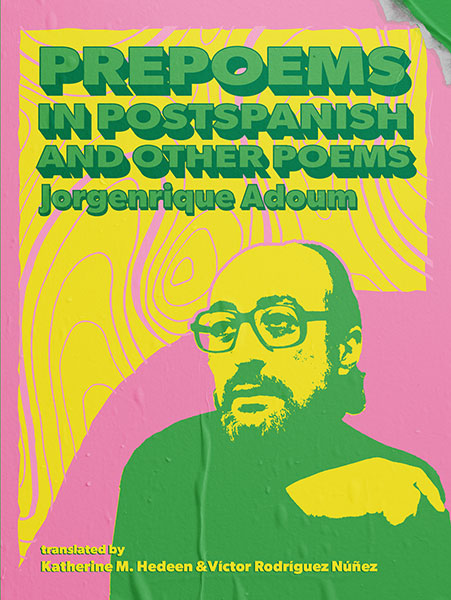
prepoems in postspanish and other poems
Jorgenrique Adoum
Translated by Katherine M. Hedeen and Víctor Rodríguez Núñez
978-0-900575-09-9 | $20 | 204 pages | March 1, 2021
Who gives a fuck about
love or poetry now
if we don’t use them
anymore
prepoems in postspanish and other poems marks the first full-length collection to appear in English by the groundbreaking Ecuadorian poet Jorgenrique Adoum (1926-2009), hailed by Nobel-prize winner Pablo Neruda as the best Latin American poet of his generation. Adoum’s poetry is at once radically experimental, fiercely lyrical, and passionately committed to social change. This timely volume showcases Adoum at his most formally innovative, gathering together three books published between 1973 and 1993: Curriculum Mortis, prepoems in postspanish, and Love Disinterred. Translators Katherine M. Hedeen and Víctor Rodríguez Núñez’s inventive and expert renderings bring Adoum’s experimentation to the fore.
REVIEWS OF PREPOEMS IN POSTSPANISH
Hedeen and Rodríguez Núñez translate Adoum’s postspanish, but they also break a different group of rules in English. It is what makes prepoems one of the most impressive translations that I’ve ever read—and I don’t say this lightly. Theirs is precisely the kind of translation that emerging and established translators, especially of writing from the Global South, should read, re-read, and re-read again. Where Adoum unsettles the limits of Spanish, opening it up to “prepossibilities” and “postpossibilities,” Hedeen and Rodríguez Núñez’s “postenglish” compels us to ask why English is the way it is, which—as Adoum teaches us—is also to ask: Why are things the way they are? What other sides exist?
Adoum’s poems, constantly straining against the bounds of discourse, present a ripe opportunity for the rethinking of language. In the moments when his speaker’s voice morphs from the impersonality of a newsreel or medical report to a stripped-down longing for a more human existence, one can sense how language is always one step removed from intent.
PRAISE FOR JORGENRIQUE ADOUM & PREPOEMS IN POSTSPANISH
The best Latin American poet of his generation.
—Pablo Neruda
For the rest of my life, I will be grateful to these translators! Jorgenrique Adoum has an extraordinary landscape for us to meet, explore “in the subsoul or the dislife” and to know poets, poetry, as new all over again. The strength of poetry has never been more evident!
—CA Conrad, author of While Standing in Line for Death
These electric poems burn and mourn, seduce and jeer. They bend language and lore; they strain against state repression. They painstakingly document the “cottony calm” and the turtle’s “historical sadness,” in a translation that attends expertly to the poems’ ecstatic coinages and revolutionary energy. It’s an awesome book.
—Natalie Shapero, author of Hard Child
ABOUT THE AUTHOR
Jorgenrique Adoum, widely-recognized as the most important Ecuadorian intellectual of the twentieth century, was an award-winning poet, novelist, essayist, and playwright. During his lifetime, he published 14 books of poetry. Of Lebanese descent, he was born in the Andean town of Ambato in 1926. As a young man, he studied in Chile, where he became Pablo Neruda’s personal secretary. He began publishing poetry in 1949. In 1960, he won the first ever Casa de las Américas prize in Cuba, soon to become the most prestigious literary prize in Latin America. He belonged to a pioneering and yet often overlooked group of Spanish American poets, which includes writers like Ernesto Cardenal (Nicaragua), Roque Dalton (El Salvador), and Juan Gelman (Argentina). Known as “conversacionalistas,” they emphasize the orality of language, as well as make use of the language of the social sciences and mass media. They innovate by challenging poetic limits, moving closer to popular culture, and requiring an active reader, one considered a co-author. Adoum spent much of the sixties, seventies, and eighties in exile, mainly in Paris, returning to Ecuador in 1987, where he continued to write. He died in Quito in 2009 and is buried at the Chapel of Man, the museum and cultural center created by his friend, the outstanding visual artist, Oswaldo Guayasamín.
ABOUT THE TRANSLATORS
Katherine M. Hedeen is a translator, literary critic, and essayist. A specialist in Latin American poetry, she has translated some of the most respected voices from the region. Her publications include book-length collections by Juan Bañuelos, Juan Calzadilla, Juan Gelman, Fayad Jamís, Hugo Mujica, José Emilio Pacheco, Víctor Rodríguez Núñez, and Ida Vitale, among many others. Her work has been a finalist for both the Best Translated Book Award and the National Translation Award. She is a recipient of two NEA Translation grants in the US and a PEN Translates award in the UK. She is a Managing Editor for Action Books and the Poetry in Translation Editor at the Kenyon Review. She resides in Ohio, where she is Professor of Spanish at Kenyon College. More information at: www.katherinemhedeen.com
Víctor Rodríguez Núñez (Havana, 1955) is one of Cuba’s most outstanding and celebrated contemporary writers, with over fifty collections of his poetry published throughout the world. He has been the recipient of major awards in the Spanish-speaking region, including, in 2015, the coveted Loewe Prize. His selected poems have been translated into Arabic, Chinese, English, French, German, Hebrew, Italian, Macedonian, Serbian, Swedish, and Vietnamese. He has been a riveting presence at the most important international literary festivals, having read in more than forty countries. In the last decade, his work has developed an enthusiastic readership in the US and the UK, where he has published seven book-length translations. He divides his time between Gambier, Ohio, where he is currently Professor of Spanish at Kenyon College, and Havana, Cuba. More information at: www.victorrodrigueznunez.com